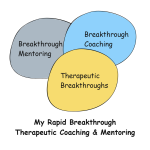·
The things that you say to yourself
can have a profound effect on your enjoyment of life, your levels of stress and
your ability to achieve your goals.
·
While I’m talking right now you are
possibly thinking about things like “How long will this talk take? Will I learn
anything useful by listening to this? I must remember to pick up the kids from
school tonight. What will we have for dinner? Etc.
·
It’s estimated that the average
person has 60,000 to 80,000 such thoughts a day
·
Many people, these thoughts are often
mulling over things that happen in the past, fearing what might happen in the
future, self-criticism, blame, guilt and a whole host of negative things.
·
Just as the things that we say to
others can have a profound effect on them, so to can the things that we say to
ourselves.
·
This sort of negative self-talk has a
debilitating effect on your self-esteem and feelings of self-worth.
·
A metaphor that is commonly used to
represent the mind is that of an iceberg. Using this metaphor, the 5% of the
iceberg that is above the water level in that can be seen represents the
conscious mind while the 95% of the iceberg below water level, which is unseen,
is the unconscious mind.
·
One way we link the conscious mind to
the unconscious mind is through the words that we use, particularly words that
come to mind unconsciously.
·
For this reason, the words that we
use can have an immense effect on our well-being and the well-being of others.
·
Another metaphor for the unconscious
mind is to consider it being like a loving 7- to-9-year-old child who trying to
keep you safe.
·
Imagine subjecting a real 7- to-9-year-old
child who is with you 24/7 to an ongoing barrage of critical and negative
comments.
·
If you were to take an audio
recording of these negative comments and play them to an objective second
party, what would they think of them?
·
Imagine being a tight-rope walker and
submitting yourself to a constant stream of these sorts of negative comments.
Is it likely to improve your performance? No, it’s much more likely to make
things very much harder for you.
·
It’s been said that the lives that we
lead are defined in part by the nature and quality of our thoughts.
·
Imagine, instead of subjecting
yourself to all these painful negative thoughts, that you were constantly encouraging
and supporting yourself, just as you might do with a real 7- to 9-year-old
child who you were coaching to be successful in all areas of life.
·
By becoming more aware of these
thoughts, we can start to begin to redirect them so that they become far more
constructive.
·
It can be constructive to recognise
the voice that you are talking to yourself with. Is it the voice of a critical
parent, former colleague or partner? The power of negative comments can be
weakened by changing the tone and nature of the voice.
·
It can also be helpful to write down
the negative things that you say to yourself and analyse them critically with
your logical conscious mind. How true are they, really?
·
If you have persistent negative
thoughts that are really troubling you, you can put an rubber band around your
wrist and flick it every time you catch yourself thinking in that way.
·
Another trick is to promise yourself
that time later in the day when you will allow those negative thoughts to enter
your mind, but, until then, they are to be kept at bay.
·
Sometimes telling your negative
thoughts to go and sit in the corner of the room for a while can help you turn
them off.
·
Mindfulness and living in the NOW
topics that I will be addressing in later videos are especially helpful in this
regard.
·
I’ll be talking more about ways of
dealing with unwanted negative thoughts in future videos.
·
Coaching can be very helpful getting
rid of these thoughts because they are frequently based on limiting and
negative beliefs. A skilled coach can help you change beliefs such as these and
remove the emotion that might be associated with them.







